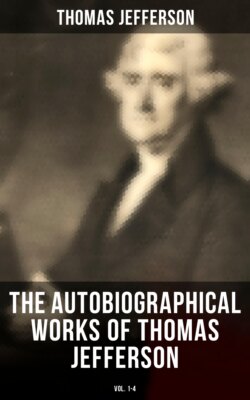Читать книгу The Autobiographical Works of Thomas Jefferson (Vol. 1-4) - Thomas Jefferson - Страница 19
На сайте Литреса книга снята с продажи.
[NOTE G.]
ОглавлениеTable of Contents
I have sometimes asked myself, whether my country is the better for my having lived at all. I do not know that it is. I have been the instrument of doing the following things; but they would have been done by others; some of them, perhaps, a little better.
The Rivanna had never been used for navigation; scarcely an empty canoe had ever passed down it. Soon after I came of age I examined its obstructions, set on foot a subscription for removing them, got an act of Assembly passed, and the thing effected, so as to be used completely and fully for carrying down all our produce.
The Declaration of Independence.
I proposed the demolition of the Church establishment, and the freedom of religion. It could only be done by degrees; to wit, the act of 1776, c. 2. exempted dissenters from contributions to the Church, and left the Church clergy to be supported by voluntary contributions of their own sect; was continued from year to year, and made perpetual 1779, c. 36. I prepared the act for religious freedom in 1777, as part of the revisal, which was not reported to the Assembly till 1779, and that particular law not passed till 1785, and then by the efforts of Mr. Madison.
The act putting an end to entails.
The act prohibiting the importation of slaves.
The act concerning citizens, and establishing the natural right of man to expatriate himself at will.
The act changing the course of descents, and giving the inheritance to all the children, &c. equally, I drew as part of the revisal.
The act for apportioning crimes and punishments, part of the same work, I drew. When proposed to the Legislature by Mr. Madison, in 1785, it failed by a single vote. G. K. Taylor afterwards, in 1796, proposed the same subject; avoiding the adoption of any part of the diction of mine, the text of which had been studiously drawn in the technical terms of the law, so as to give no occasion for new questions by new expressions. When I drew mine, public labor was thought the best punishment to be substituted for death. But, while I was in France, I heard of a society in England who had successfully introduced solitary confinement, and saw the drawing of a prison at Lyons, in France, formed on the idea of solitary confinement. And, being applied to by the Governor of Virginia for the plan of a Capitol and Prison, I sent him the Lyons plan, accompanying it with a drawing on a smaller scale, better adapted to our use. This was in June, 1786. Mr. Taylor very judiciously adopted this idea, (which had now been acted on in Philadelphia, probably from the English model,) and substituted labor in confinement, to the public labor proposed by the Committee of revisal; which themselves would have done, had they been to act on the subject again. The public mind was ripe for this in 1796, when Mr. Taylor proposed it, and ripened chiefly by the experiment in Philadelphia; whereas, in 1785, when it had been proposed to our Assembly, they were not quite ripe for it.
In 1789 and 1790, I had a great number of olive plants, of the best kind, sent from Marseilles to Charleston, for South Carolina and Georgia. They were planted, and are flourishing; and, though not yet multiplied, they will be the germ of that cultivation in those States.
In 1790, I got a cask of heavy upland rice, from the river Denbigh, in Africa, about lat. 9° 30’ North, which I sent to Charleston, in hopes it might supersede the culture of the wet rice, which renders South Carolina and Georgia so pestilential through the summer. It was divided, and a part sent to Georgia. I know not whether it has been attended to in South Carolina; but it has spread in the upper parts of Georgia, so as to have become almost general, and is highly prized. Perhaps it may answer in Tennessee and Kentucky. The greatest service which can be rendered any country is, to add an useful plant to its culture; especially a bread grain; next in value to bread is oil.
Whether the Act for the more general diffusion of knowledge will ever be carried into complete effect, I know not. It was received, by the legislature, with great enthusiasm at first; and a small effort was made in 1796, by the act to establish public schools, to carry a part of it into effect, viz. that for the establishment of free English schools; but the option given to the courts has defeated the intention of the Act.*
* It appears, from a blank space at the bottom of this paper, that a continuation had been intended. Indeed, from the loose manner in which the above notes are written, it may be inferred that they were originally intended as memoranda only, to be used in some more permanent form.
